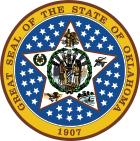| Candidate | Votes | % |
|---|
| District 4 | | | Mike Brown | 6,284 | 82.48% | | | Matthew R. Jones | 1,335 | 17.52% | | District 6 | | | Chuck Hoskin | 6,333 | 60.95% | | | Wayland Smalley | 4,057 | 39.05% | | District 10 | | | Steve Martin | 4,774 | 53.87% | | | Kent Jeter | 4,077 | 46.13% | | District 14 | | | George Faught | 4,774 | 53.77% | | | Jeff Potts | 4,104 | 46.23% | | District 15 | | | Ed Cannaday | 6,675 | 77.17% | | | Ray Bond | 1,975 | 22.83% | | District 20 | | | Paul D. Roan | 5,260 | 59.65% | | | Johnny Sandmann | 3,588 | 40.35% | | District 23 | | | Sue Tibbs | 3,912 | 54.81% | | | Steve Gallo | 3,226 | 45.19% | | District 25 | | | Todd Thomsen | 4,798 | 50.01% | | | Darrell E. Nemecek | 4,796 | 49.99% | | District 26 | | | Kris Steele | 5,315 | 63.47% | | | Joe Freeman | 3,095 | 36.53% | | District 27 | | | Shane Jett | 5,347 | 60.51% | | | Ken Etchieson | 3,490 | 39.49% | | District 28 | | | Ryan Dean Kiesel | 5,454 | 63.86% | | | Billy Choate | 3,087 | 36.14% | | District 29 | | | Skye McNiel | 5,038 | 51.32% | | | Kathryn S. Thompson | 4,778 | 48.68% | | District 30 | | | Mark McCullough | 5,151 | 54.79% | | | Melinda Johnson Ryan | 4,251 | 45.21% | | District 31 | | | Jason Murphey | 6,544 | 57.12% | | | Thomas R. Cook | 4,913 | 42.88% | | District 32 | | | Danny Morgan | 7,705 | 71.59% | | | Carl Randall | 3,058 | 28.41% | | District 33 | | | Lee R. Denney | '5,976 | 70.01% | | | Chad Swanson | 2,560 | 29.99% | | District 35 | | | Rex Duncan | 6,572 | 67.14% | | | Joe Vickers | 3,216 | 32.86% | | District 36 | | | Scott N. Bighorse | 4,828 | 52.94% | | | Eddie Fields | 4,291 | 47.06% | | District 37 | | | Kenn Luttrell | 5,184 | 55.71% | | | Stan Paynter | 4,122 | 44.29% | | District 40 | | | Mike Jackson | 6,120 | 73.14% | | | Pierce Jones | 2,247 | 26.86% | | District 41 | | | John T. Enns | 8,730 | 71.00% | | | Carol Ruth | 3,566 | 29.00% | | District 43 | | | Colby Schwartz | 6,902 | 64.66% | | | Earline Smaistrla | 3,773 | 35.34% | | District 44 | | | Bill Nations | 6,023 | 72.37% | | | Gary D. Caissie | 2,299 | 27.63 | | District 45 | | | Wallace Collins | 5,359 | 50.42% | | | Thad Balkman | 5,270 | 49.58% | | District 46 | | | Scott Martin | 7,680 | 60.50% | | | Tom Robinson | 5,014 | 39.50% |
| | Candidate | Votes | % |
|---|
| District 49 | | | Terry M. Hyman | 5,307 | 63.28 | | | Bettie D. Johnson | 3,079 | 36.72% | | District 50 | | | Dennis Johnson | 5,623 | 52.46% | | | Melvin Jones | 5,095 | 47.54% | | District 53 | | | Randy Terrill | 6,783 | 64.18% | | | Troy Green | 3,786 | 35.82% | | District 55 | | | Ryan McMullen | 6,262 | 67.01% | | | Charlie Wieland | 3,083 | 32.99% | | District 59 | | | Rob Johnson | 5,842 | 53.31% | | | Richie Oakes | 4,399 | 40.14% | | District 62 | | | T.W. Shannon | 3,845 | 58.32% | | | Janice Drewry | 2,748 | 41.68% | | District 64 | | | Ann Coody | 3,791 | 65.96% | | | Larry Jordan Jefferson | 1,956 | 34.04% | | District 69 | | | Fred Jordan | 8,119 | 75.48% | | | Cory N. Spogogee | 2,638 | 24.52% | | District 70 | | | Ron Peters | 8,334 | 66.31% | | | Mike Workman | 4,234 | 33.69% | | District 74 | | | David Derby | 6,476 | 57.45% | | | Wayne Guevara | 4,352 | 38.61% | | | Bob Batterbee | 445 | 3.95% | | District 77 | | | Eric Proctor | 3,386 | 51.66% | | | Mark Liotta | 3,169 | 51.66% | | District 78 | | | Jeannie McDaniel | 5,378 | 53.13% | | | Jesse Guardiola | 4,745 | 46.87% | | District 80 | | | Ron Peterson | 7,287 | 71.25% | | | Kimberly Fobbs | 2,940 | 28.75 | | District 83 | | | Randy McDaniel | 7,763 | 65.93% | | | Ed Holzberger | 3,354 | 28.48% | | | George S. Farha | 658 | 5.59% | | District 85 | | | David Dank | 6,410 | 50.50% | | | Jennifer Seal | 6,282 | 49.50% | | District 87 | | | Trebor Worthen | 4,752 | 51.52% | | | Dana Orwig | 4,472 | 48.48% | | District 92 | | | Richard D. Morrissette | 3,209 | 62.40% | | | Michael Starega | 1,934 | 37.60% | | District 93 | | | Al Lindley | 2,823 | 50.77% | | | Mike Christian | 2,737 | 49.23% | | District 94 | | | Scott Inman | 4,269 | 54.20% | | | Rex Barrett | 3,607 | 45.80% | | District 95 | | | Charlie Joyner | 4,347 | 56.26% | | | Lee Roy Tucker | 3,380 | 43.74% | | District 96 | | | Lance Cargill | 8,542 | 67.84% | | | Abe Warren | 4,050 | 32.16% | | District 98 | | | John Trebilcock | 6,582 | 66.86% | | | Rae Weese | 3,262 | 33.14% | | District 99 | | | Anastasia Pittman | 4,886 | 76.85% | | | Willard Linzy | 1,166 | 18.34% | | | J.M. Branum | 306 | 4.81% |
|











